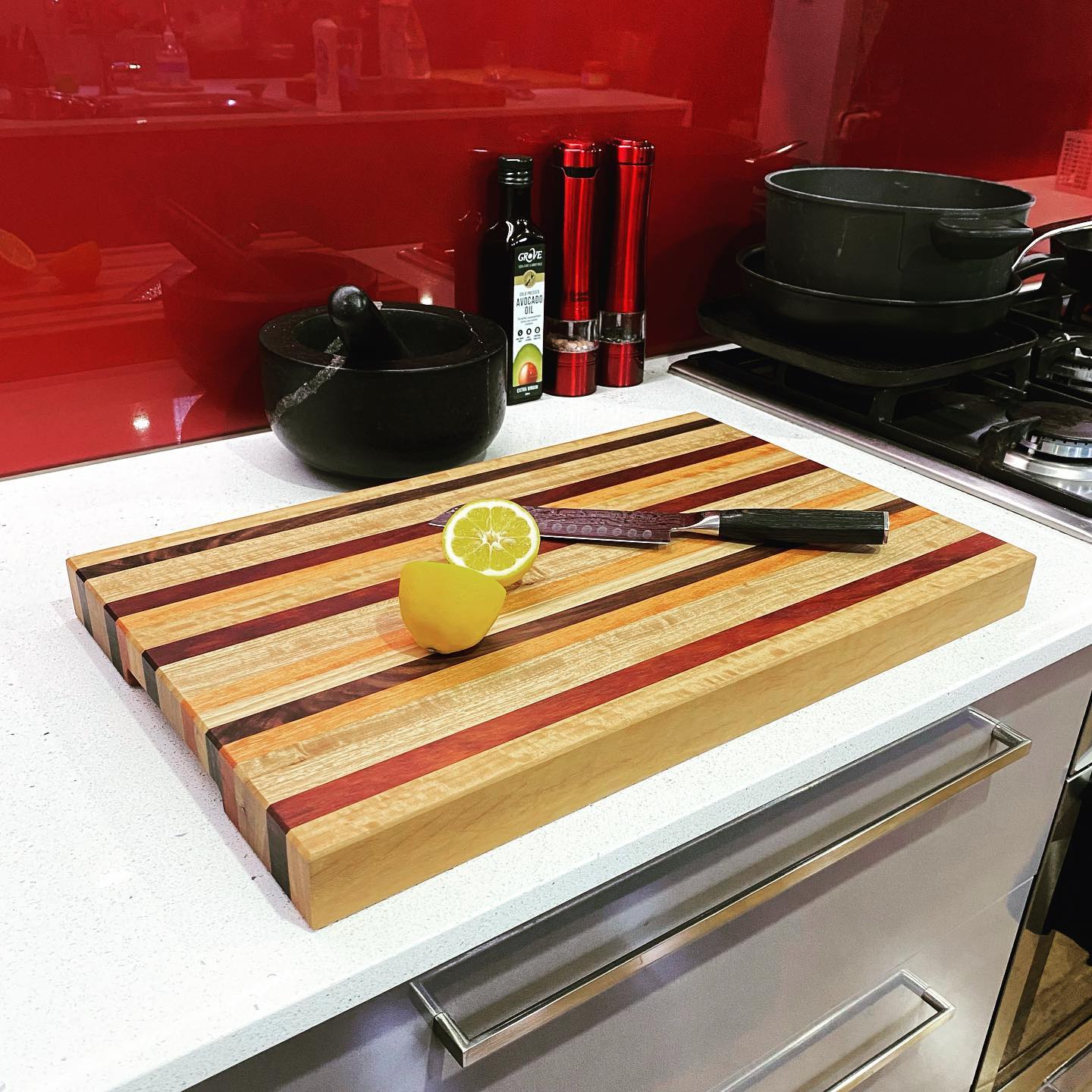tldr: Overachievers/perfectionists need to talk to themselves like they’re in kindergarten sometimes, and celebrate the macaroni necklaces even if they’re ugly.
“You’re so lucky you can make your own clothes!” exclaims an acquaintance at a networking event after complimenting me on my skirt. “I could never do that!”
“Oh my god I can’t believe you made those, you’re so crafty!” Remarks a friend about my cute planet earrings.
“Wow that is so beautiful, you should sell these!” Comments a family member on a picture of a cutting board we made for my sister.

The look on the face of the lady at Spotlight when I told her I was making a skirt out of this fabric was priceless. It has pockets and made me two new friends. 
I made these purple planet earrings out of polymer clay. I learned the basics from the amazing Serena at Studio Peppercorn. 
Our first proper cutting board! We made this out of five different types of wood for my sister to her specifications for her Birthday.
I grew up in a family where creating things was always encouraged – from art to clothes, to furniture. Being good wasn’t necessarily a prerequisite either and I can’t count the number of times mum told me that something made was worth more than something bought.
A lifetime of encouragement has made a big difference in the way that I treat creative pursuits vs. literally any other type of achievement. When I make a dress I enjoy the process of planning and executing, even if the final product is lopsided and I never wear it. If it turns out amazing it is really just the icing on the cake – it’s like going to a fun event and winning a door prize.
On the flip side, if I only got 90% on a test as a child I would literally cry. As the “smart one” I was pushed to be the best version of myself and taught to value the results of academic work more so than the experience of learning. It probably wasn’t on purpose (and for the most part I’m grateful that I was pushed to excel because I’m inherently lazy without encouragement) and I am sure a large part of this attitude was due to my own personality flaws.
As an adult who has tried and failed at SO MANY things, I’m a lot more conscious of my tendency to hold myself to ridiculously high standards than I used to be. It’s definitely still something I should work on, but at least I can identify when it happens now and maybe beat myself up a bit less when I don’t win the award, land the client or when I make a dumb mistake that costs me half a day of work.
One of the biggest influences on how I treat my own failures is watching my husband deal with his. He is one of the cleverest people I know and is almost always great at whatever he puts his mind to. Unfortunately, when he isn’t amazing at something (or even worse – when he experiences a setback doing something he knows he’s good at) he goes into a spiral of beating himself up that makes the situation infinitely worse than if he just dealt with it and moved on. He recently took up chess again, and so far I haven’t been able to beat him in a fair and even game (sometimes he lets me win). In true Ross style, he didn’t start casually playing – he binge-watched hours of chess tutorials on YouTube and has played over 1200 games online in just a couple of months. None of our friends want to play against him because he is always 10 steps ahead and wipes us off the board. Unfortunately, being above average isn’t enough for my beloved husband. He wants to be better than every stranger on the internet, even though logically some of those strangers have been playing competitive chess since childhood.
In the last couple of years, we’ve started making things. It started as the odd woodworking project and now we have a garage lined with power tools, a 3D printer on the kitchen table, and an ever-growing Pinterest board full of ideas for what to make next.
At first, Ross approached our maker projects with a similar perfectionist attitude he brings to everything. But as we make more stuff, we also make more mistakes. We drill holes in the wrong place. We spray paint on too thick and get goopy bits. We cut stuff too short and miscalculate our 3D models three times before getting them right.
Making mistakes makes us better, helps us learn how to make better. The more we make, the better we make. The more mistakes we make, the better we learn to deal with them.
What’s the point?
Challenges make us better. They help us build and maintain neuroplasticity so we learn more & faster. If you’re afraid to fail you’ll never get better.
Go make bad art.
I never lose. I either win, or learn.
Nelson Mandela

